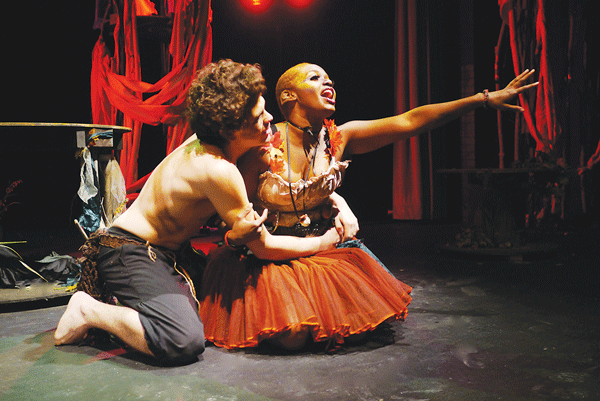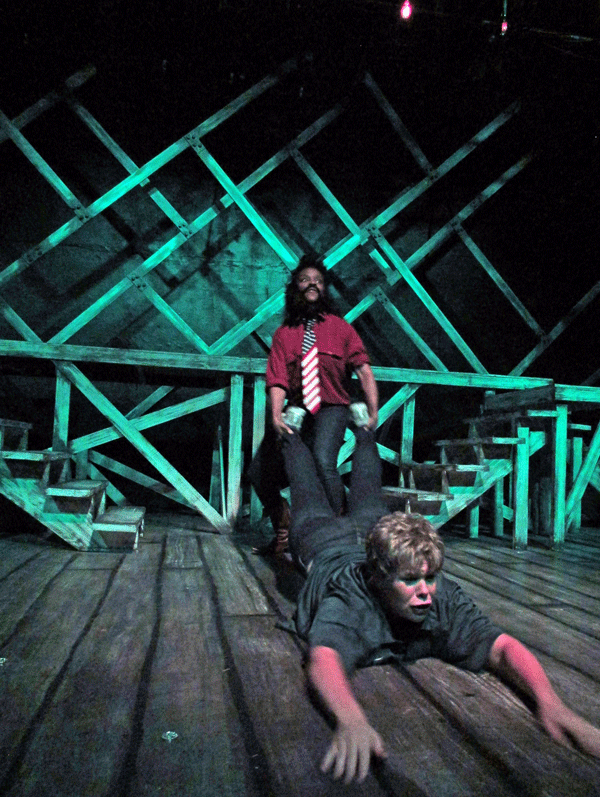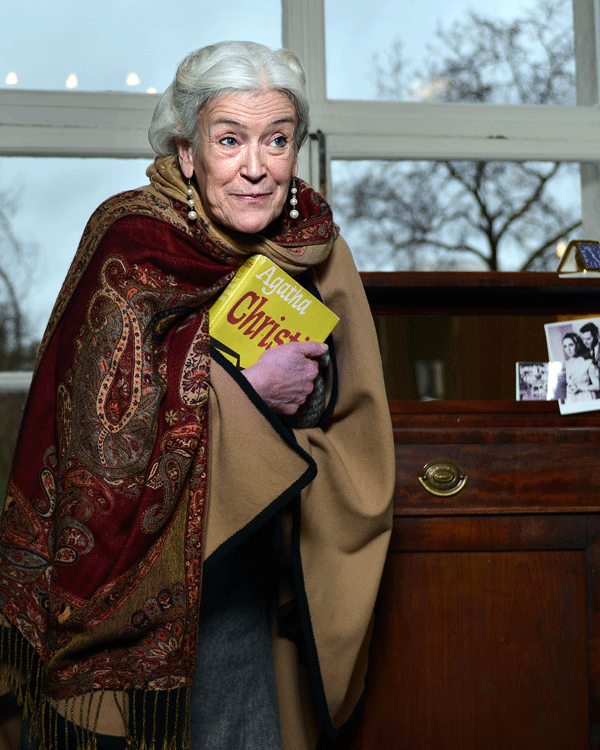
BY SCOTT STIFFLER | General Manager Christian De Gré is happy about the large dark cloud hovering over this year’s New York International Fringe Festival.
Other than its abbreviation — FringeNYC — there’s nothing small-scale about this 17-day, 18-venue East and West Village marathon of comedy, drama, music, and dance. For the 200 applicants chosen (out of roughly 800 hopefuls), being part of FringeNYC gives them a globally recognized resume credit whose implied credibility will never fade. So why all the glum faces?
“This year, in terms of submissions,” says De Gré of the jury process, “we had a lot of shows about death and suicide.” They include “The Most Fun Funeral,” “Fatty Fatty No Friends,” “Depression: The Musical,” “The Death Monologues,” “Clive Barker’s History of the Devil” and “Campo Maldito” — which, De Gré says, “is about ghosts and Santeria priests. There’s also a lot of [shows about] bullying and abuse, so it’s darker than usual.”
Themes emerge among FringeNYC’s 200 shows
Every year, notes De Gré, FringeNYC seems to have at least one recurring motif. Audiences should consider themselves lucky to find so much doom and gloom on the boards in 2014, given the alternative. “As we were doing the panel work one year,” recalls De Gré, “a Martha Stewart theme emerged.”
Happily, times have changed and the zeitgeist has shifted — so this year, you won’t see any self-satisfied residents of Connecticut demonstrating the proper technique for fashioning birdhouses out of gourds. There will, however, be another entry in the very long tradition of wringing comedy and pathos from Utah’s favorite religion. Years before Broadway embraced “The Book of Mormon,” FringeNYC was on that bandwagon, presenting more than a few shows in which Mormons struggled with their sexuality (a topic that’s produced both compelling and cringe-worthy iterations).
At least this year’s entry, “The Mormon Bird Play,” has a legitimate claim to being original — billing itself as “a Mormon fantasia” in which “six men play little girls who become birds that manifest themselves as Mormon temple workers and pioneer women.” Oh, and also? There’s burlesque!
THEATER | FringeNYC The New York International Fringe Festival A production of The Present Company Through Aug. 24 Weekdays, 2 p.m. – midnight Weekends, 12 p.m. – midnight Tickets: $18 Advance Purchase: FringeNYC.org By Smartphone: FringeOnTheFly.com Credit Card purchase at the Box Office Cash sales only at FringeCentral (114 Norfolk St., btw. Rivington & Delancey Sts.)
“The festival is reflective of the submissions,” says De Gré, in an attempt to bring some sense of logic into a juried process that would champion the supremely odd abovementioned narrative. “We find the interesting ones,” he proudly asserts, in what might be the understatement of the year.
Hey, if you want the spit, polish and safety of a Broadway production, take the train a few dozen blocks Uptown. Below 14th Street, for two weeks in August, it’s all about embracing the edge by surfing the Fringe. Even the odd stuff, though, tends to break down along party lines — so here are our top picks from this year’s batch of (highly unusual) usual suspects.
SHAKESPEARE ADAPTATIONS: THE NEVER-ENDING STORY “Twelfth Night” happens twice at this year’s Fringe — first, in the form of a time/space-tripping production from the Manhattan-based Helikon Rep company. Billed as a “spinning, provocative exploration of desire,” their gender-bending production of “The Sun Experiment” has, among its three love triangles, the pursuit of Eros by philosopher Ludwig Wittgenstein. With 10 songs inspired by the play’s opening line (“If music be the food of love, play on”), Essential Theatre Group’s “Twelfth Night” reimagines the comedic tale of shipwrecked siblings as a folk musical. A FringeHIGH (as in, high school) production, it’s fit for consumption by all ages. Find out how director Tony Lance made Shakespeare’s text sing, when he takes part in an Aug. 12 panel discussion about stage adaptations (see the FringeU section, at fringenyc.org).

When you’re playing a character who’s feigning madness, it helps to possess a spark of genuine insanity. That’s the beautiful logic behind this farce from comedian David Carl. “Gary Busey’s One Man Hamlet” finds the off-kilter Hollywood actor using homemade puppets, videos, live music and poetry to mount his own production. The personal demons Busey injects into his melancholy Dane might just pale in comparison to the indignities suffered by “BURBAGE: The Man Who made Shakespeare Famous.” In this comedy from the Bay Colony Shakespeare Company, Richard Burbage (“the world’s first Hamlet”) sounds off on life as an interpreter of the Bard — which includes copious amounts of backstage politics and sex!
July on Fire Island turns out to be no vacation, when four unsuspecting men are stranded there by “The Hurricane.” With book, music and lyrics by Bjorn Berkhout, this take on “The Tempest” has the transgender Madam Sparrow assuming Prospero’s function — by using a mojo-infused monkey paw to conjure the titular storm and trap her quarry. Can she exact her revenge before the spell’s 24-hour winds die down?
Three productions use good old Willy S. as a key ingredient or jumping off point. “Wing to the Rooky Wood” is a multi-media production by Brooklyn’s Renaissance Now Theatre & Film company, which incorporates elements of Chekhov’s “The Seagull,” Brontë’s “Wuthering Heights” and Shakespeare’s “Macbeth.” Photographic imagery and dynamic physical gestures are used to tell the story of all three classics. MAUS Theater of Berlin also does the mash, with “Come Thick Night,” in which a young woman’s nightmare about patricide has elements of Ingmar Bergman movies, Elvis Presley music and “Macbeth” plot points. Coming to us by way of a New Orleans Fringe run, the Elizabethton, TN-based DriftingTheatre company’s rumination on an unseen character from “A Midsummer Night’s Dream” is heavy on forests, fairies and fanciful backstories. “Human” fleshes out the changeling boy — here, imagined as a mortal named Kellen who must navigate a destructive, planet-endangering rift between Queen Titania and King Oberon.
GAMER PLAYS By day, Samuel Pitt Stoller teaches psychology to undergraduates at Hunter College — but by night, the Great Neck, NY-born headshrinker has been toiling away at the largely thankless job of budding comedy writer. His throwback subject matter: the pipe-traversing plumbers Mario and Luigi, whose Nintendo/Super Nintendo adventures left an indelible impression on the 1984-born gamer. But where are they now? Stoller’s musical comedy, “Jump Man,” answers that question, then sends the brothers on a redemptive quest.
Retired from the rescue racket, our story opens in an unassuming Brooklyn plumbing shop. Having taken former Mushroom World princess Peach as his bride, Mario’s content — while Luigi dreams of past glories (when he’s not out cold due to excessive alcohol consumption). Then fate comes knocking, when people start mysteriously disappearing from the neighborhood. Could long-dead nemisis Bowser be the culprit? Luigi jumps at the chance to be a hero again, but Mario wants to stay put. Stoller’s musical parody has all the thematic tropes and visual trappings of the games he grew up on — but why do his plumbers sing? “The musical compositions in the Mario Brothers series are legitimately masterful,” he asserts, on the project’s successful Kickstarter page. Poised to make its debut at Theatre 80, Stoller’s hoping to score some points with tunes of his own.

Elsewhere in the East Village (at The Players Theatre), another classic arcade game gets the musical comedy treatment. Written by “Late Night with Seth Meyers” scribe Amber Ruffin and Second City alum Lauren Van Kurin, “King of Kong: A Musical Parody” is a two-person comedy. It’s inspired by the 2007 documentary, “The King of Kong: A Fistful of Quarters” — an alternately poignant and pitiful look at two men vying to reach the highest Donkey Kong score.
WOMEN OF A CERTAIN AGE Back in 2012, longtime West Village resident D’Yan Forest (then, age 77) became the oldest solo show performer in FringeNYC history, with “I Married a Nun” — her ukulele-strumming tale of bisexuality. Since then, she’s been touring with the equally zesty (and somewhat less smutty) bilingual cabaret show, “Around the World in 80 Years.” A trio of 2014 shows are generating the kind of pre-performance buzz that Forest enjoyed, and not just because they fit the senior-themed profile (although they’re not above using that as a hook).

“Tales From Geriassic Park: On the Verge of Extinction” finds seventysomething Verna Gillis (“Her niche is aging!”) embracing the march of time. It’s no wonder this gig is billed as a “One Older-Woman Reading” of a work in progress. You’d need notes too, if you had earned a Ph.D. in ethnomusicology, spent 1972-1978 recording traditional music throughout the world, founded the American International Sculptors Symposium, developed the Poetry in Public Places initiative, and opened Soundscape — the first multi-cultural music performance space in New York City (1979-1984). You’ll hear about it all, plus get some zingers from her recently published book of one-liners (“I Just Want to be Invited — I Promise Not to Come”).
Not to be outdone in the life-lived-well department, Joan Shepard’s “Confessions of Old Lady #2” garnered four stars from the London Times. It’s a musical memoir of her long career — which goes from an age seven appearance in Laurence Olivier’s 1940 Broadway production of “Romeo & Juliet” all the way up to a recent gig on HBO’s “Girls.” Between those brackets, she was a radio Quiz Kid and a pioneer of 1950s television who founded the River Rep Theatre Company with actor husband Evan Thompson, raised two kids and had memorable run-ins with Lenny Bruce and Elvis.
She gives James Bond and Sherlock Holmes a run for their money, when it comes to successful screen adaptations — but when Margaret Rutherford was cast as Miss Marple, Agatha Christie voiced displeasure at having her unassuming spinster sleuth played by “the funniest woman alive.” As told by the solo show “Murder Margaret and Me,” Christie eventually forged a bond with Rutherford — then did some sleuthing and excavated a few dark secrets that could have been torn from the pages of a Marple mystery. Janet Prince brings the author and the actress to life, in the show’s U.S. debut (it’s been garnering raves ever since a sold-out run at the 2012 Edinburgh Fringe).

SOLO SHOWS, WHOSE SCRIPTS WE’VE READ None other than Dave Chappelle — a genuine comedic genius — has declared Filipina-American character actress Nicole Maxali’s “Forgetting The Details” to be “funny, heart-warming and funny again.” The funny part comes from Maxali’s ability to add fresh ingredients to a familiar solo show recipe (the old family conflict and ethnic heritage routine). The heart-warming part comes from her witty and rambunctious grandmother’s slow slide into an Alzheimer’s haze. The funny again part? Well, that’s the good news. Maxali never really does stop finding amusing ways to mine humor from the nasty scars made by her absentee mother, pothead father and reckless youth. Neglecting her ailing grandmother while using the family as material for comedy shows, Maxali is all alone by the time she links that genetic predisposition for abandonment to her own years of isolation and rebellion. It’s a stunning realization that stays with you long after the last joke is told.
Lifting its title from a song lyric that expresses the bliss of finding crystal clarity on the FM radio dial, “No Static At All” is Alex Knox’s quest to locate his own perfect frequency — by reconstructing how an intense bond with his best high school friend, Josh, was forged and broken. When confident Josh ventures into the world only to have his mind further clouded by each new idea he embraces, Knox clings to occasional moments of contact with his fading friend — then finds comfort in the Walter Becker/Donald Fagen dynamic behind Steely Dan’s complex musical arrangements. He also sees himself in a Biblical tale of twin brothers, eventually grasping at a possible connection between his own estranged relationship and a recently unearthed relic in Israel.

Writer and performer Knox is more than a conspiracy theorist throwing a pity party. He’s an introspective searcher working his way towards the realization that nobody can depend on a single band, buddy, or belief system. Vote of confidence: “No Static At All” won the Best Solo Performance award at the 2013 Hollywood Fringe. Bonus vote of confidence, followed by a metaphor: This show has lots of Steely Dan music — with Knox making the case for its lasting appeal, despite some acknowledged shortcomings.
Okay. Strictly speaking, it’s not a solo show. Writer and performer Marianne Pillsbury does, after all, share the stage with a Greek chorus that gives life to the multitude of voices in her head — and there are so many, they handily outnumber the amount of people on stage during the curtain call at “Les Misérables.” Now add in a few dancing prescription pills, a therapist named Joy and a recurring bit that has Pillsbury channeling Bob Newhart (by way of one-sided phone conversations with her well-intentioned but soul-crushing mom). The result, we’re happy to report, is “Depression: The Musical.”

Built on the solid foundation of a time-tested comedic device (the self-deprecating neurotic), writer and main performer Pillsbury graduates quickly from Woody Allen territory by functioning as more of a tart observer than a cynical nebbish. Presenting her story as a “darkly humorous but ultimately uplifting pop-rock musical about falling apart and putting yourself back together” (that’s her one-line pitch) also sweetens the pot — and then, there’s the sudden appearance of a lesbian love interest whose own baggage gives new AA member Pillsbury the self-improvement project she’s been looking for.
“When you do get some relief from fixating on yourself and everything that’s wrong with your own life, it might occur to you that you can help fix someone else!” says Pillsbury, who soon finds herself alone again and forced to take a good, long look in the mirror. Fortunately for us, her life-altering breakthrough comes in the form of a song whose title makes a pretty good mantra, no matter what your state of mental health is: “Oh, I’ve Gotta Let Go.”

















